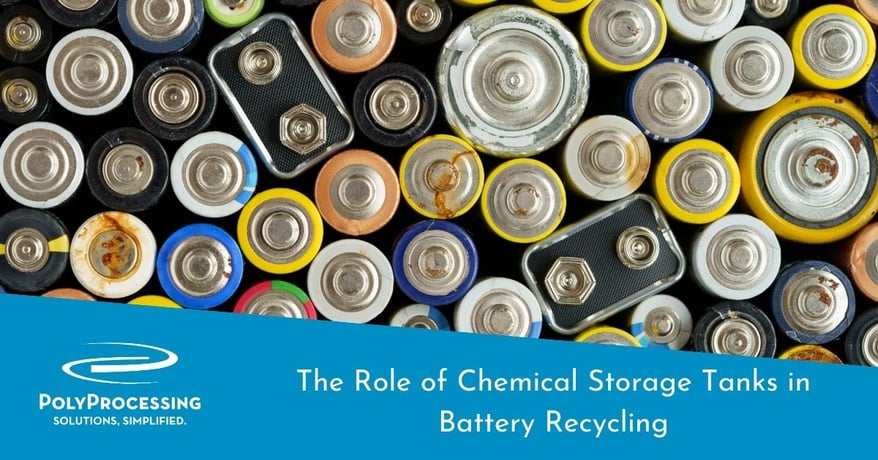The Role of Chemical Storage Tanks in Battery Recycling

As the demand for rechargeable batteries continues to rise, battery recycling has become a crucial process for environmental sustainability. Battery recycling involves the recovery of valuable materials from used batteries, including lithium, cobalt, nickel, and other metals.
One essential component in this process is the use of chemical storage tanks. These tanks play a vital role in ensuring the safe handling and storage of chemicals used during battery recycling.
In this article, we will explore the importance of chemical storage tanks in the battery recycling industry.
Ensuring Safety
Chemicals used in battery recycling, such as acids, alkalis, and solvents, can pose significant health and safety risks if mishandled. Chemical storage tanks are designed to provide a secure and controlled environment for storing these potentially hazardous substances.
In particular, Poly Processing’s chemical tanks are constructed with crosslinked polyethylene materials that are resistant to corrosion and leakage — ensuring that the harshest battery recycling chemicals are contained and that their integrity remains intact.
Preventing Contamination
Battery recycling involves the separation and recovery of valuable metals and minerals from discarded batteries. This process is called hydrometallurgy.
Hydrometallurgy is a chemical recycling process that is used on spent lithium-ion batteries. Acids leach metals from the batteries and the metals are dissolved in a corrosive solution. The metals can later be separated out of the solution and recovered for reuse.
Hydrometallurgy generates significant amounts of hazardous sulfate waste as a byproduct. The waste must be landfilled.
During hydrometallurgy, various chemicals are used in different stages of the process. Chemical storage tanks are specifically designed to prevent cross-contamination by storing different types of chemicals separately. This segregation prevents any unwanted chemical reactions.
Storage Capacity and Flexibility
Chemical storage tanks are available in a wide range of sizes to accommodate the varying needs of battery recycling facilities. From small-scale operations to large recycling plants, tanks can be chosen based on the storage capacity you need.
Moreover, tanks can be custom-built to meet specific requirements, such as temperature control, mixing capabilities, and easy access for operators. This flexibility ensures that chemicals used in the battery recycling process are stored efficiently.
Environmental Protection
Battery recycling facilities must prioritize environmental protection to minimize their impact on both land and water resources. Chemical storage tanks are designed with secondary containment systems to catch and contain potential leaks or spills. This prevents chemicals from seeping into the ground or contaminating nearby water sources, safeguarding the environment and the health of surrounding ecosystems.
Download our Secondary Containment Guide
Compliance with Regulations
Battery recycling, like any other industry, is subject to stringent regulations governing the handling, storage, and disposal of chemicals. Chemical storage tanks play a pivotal role in complying with these regulations.
By securely storing the chemicals, ensuring proper labeling, and having appropriate spill containment measures in place, recycling facilities can meet the necessary legal requirements and demonstrate their commitment to responsible waste management.
The Right Chemical Storage Tank for Battery Recycling
In the battery recycling industry, chemical storage tanks are indispensable for ensuring the safe and efficient handling of chemicals throughout the process. These tanks promote safety, prevent contamination, offer storage flexibility, protect the environment, and assist recycling facilities in complying with regulations.
By incorporating chemical storage tanks into their operations, battery recyclers can contribute to the circular economy by recovering valuable materials from used batteries while minimizing their environmental footprint.
Poly Processing Company supplies chemical storage tanks to several battery recycling facilities throughout the country. Talk with us to determine the right storage solution for your particular application.
- January 29, 2024
- Topics: Chemicals
About Poly Processing
Posts By Topic
Tech Talk Podcast Episodes
Subscribe By Email
Recent Posts
- Why Cycling Causes Tank Failure: Tips for Prolonging Tank Life
- Small Changes in Tank Selection for Big Long-Term Cost Benefits
- NSF Certification vs. FDA Compliance: Understanding Chemical Tank Standards
- Why Chemical Storage Tank Wall Thickness Matters and How to Get It Right
- The Best of 2025 - Top 5 Chemical Storage Blogs
Tank Configurator

Find the recommended tank and system components for your chemical storage challenge.
Configure a Tank Package




